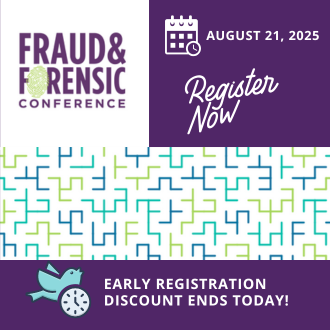Understanding a criminal tax investigation: Could you unknowingly be an accomplice?
2025 Fraud & Forensic Conference highlight: Early registration discount ends TODAY, July 24!

What you don’t know might actually hurt you, especially when it comes to criminal tax investigations. Bob Webb, partner, and Justin Yarnell, CPA, senior associate, Federal Tax Controversy attorneys with Frost Brown Todd, want to make sure you can identify potential crimes as a CPA.
The pair will share their collective expertise at OSCPA’s 2025 Fraud & Forensic Conference. “Our experience is relevant to the kinds of issues CFOs and controllers may run into,” Yarnell said.
“CPAs think tax crime doesn’t apply to them because they don’t personally commit tax crimes,” Webb said. “We want to demonstrate the need to understand the criminal tax world enough to make sure you don’t step on any traps or get caught up in a conspiracy without realizing you’re doing so. We want to teach you to avoid the traps and broad reach of the criminal tax laws.”
Webb said there are so many things for CPAs to consider when it comes to ethics and rules. What can you disclose to the IRS? When can you disclose it? What if an agent walks into your office to talk to you about a tax return. What should you do? What should you say?
Yarnell said problems can unknowingly begin when a taxpayer is being audited by the IRS’ civil side. The taxpayer receives an information request and submits documentation in support of their deduction. “This is a very common occurrence when a taxpayer is audited,” he said. “The taxpayer is simply proving that deduction, but suddenly they’re accused of committing fraud. A lot of our time and energy is spent fighting about situations like this.”
Yarnell and Webb will cover the differences between civil fraud and criminal fraud. “People always find that fascinating,” Webb noted.
Their presentation will also cover options available to taxpayers through the IRS’ Voluntary Disclosure Program, which Webb described as a ‘Get Out of Jail Free’ card in Monopoly. “It’s not immunity, but it’s close,” he said. “Our goal is to educate attendees about the programs available and bring solutions to their clients’ problems.”
Webb said they’ll also be touching on the basics of Kovel agreements for CPAs and their clients. “I can make the CPA part of my attorney-client privilege umbrella so the CPA can have open conversations and communication with the client that are privileged, that the government can’t force the CPA to talk about,” he explained.
What if the IRS sends a civil agent in to do a civil exam to help the criminal side of a case? It may sound unlikely, but Webb said it happens. “Sometimes agents are sneaky,” he said. “And a taxpayer answers questions and provides documents to the IRS because they think it’s just a civil audit and don’t realize special agents from the criminal division are directing the civil agent on what to ask and what documents to get. It’s subterfuge, it’s a potential constitutional violation, and we see it happen,” he said. “If you know what to look for in handling an audit for a client, you can read the tea leaves and know what’s going on.”
The early registration discount ends today – July 24 – REGISTER NOW to join Webb and Yarnell and other experts in their fields at the Fraud & Forensic Conference. Group discounts are also available!
